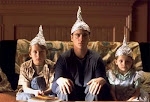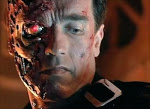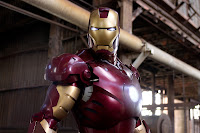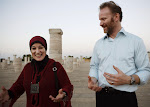 50 First Dates stars Adam Sandler as Henry Roth, Drew Barrymore as Lucy Whitmore, Rob Schneider as Ula and Sean Astin as Doug Whitmore... most of the usual Adam Sandler gang make an appearance as well.
50 First Dates stars Adam Sandler as Henry Roth, Drew Barrymore as Lucy Whitmore, Rob Schneider as Ula and Sean Astin as Doug Whitmore... most of the usual Adam Sandler gang make an appearance as well.
Henry's heart for Lucy in 50 First Dates resembles God's heart for His people. Since God set us apart for Himself, He has sought us out tirelessly. He is continually offsetting our forgetfulness with His steadfast love.
God's love toward us is unconditional... it has to be. Apart from His Spirit we would forget the purpose for which He created us... heck, we would forget that He created us at all.
50 First Dates
Lion King
 "And the great dragon was thrown down, that ancient serpent, who is called the devil and Satan, the deceiver of the whole world — he was thrown down to the earth, and his angels were thrown down with him. And I heard a loud voice in heaven, saying, "Now the salvation and the power and the kingdom of our God and the authority of his Christ have come, for the accuser of our brothers has been thrown down..."
"And the great dragon was thrown down, that ancient serpent, who is called the devil and Satan, the deceiver of the whole world — he was thrown down to the earth, and his angels were thrown down with him. And I heard a loud voice in heaven, saying, "Now the salvation and the power and the kingdom of our God and the authority of his Christ have come, for the accuser of our brothers has been thrown down..."
-- Revelation 12
Parallels between Lion King and God's Kingdom:
The rightful king has been displaced. There is an impostor who has temporarily usurped the king's throne. The kingdom awaits the return of the king's son to restore peace and harmony.
Even the hyenas shutter at the mention of Mufasa's name. Even though Mufasa seems to be long gone, Scar still fears his reputation. For this reason Scar forbids anyone from mentioning the name, "Mufasa." Scar realizes that it would be better for him that people never think about Mufasa... he doesn't want people to remember the superior quality of life they enjoyed while Mufasa ruled.
Satan temporarily rules the world as we know it because God allows him. This is evident by the fact that sin infects everything and everyone and God's will is not being carried out by everyone all the time (as it is in heaven). In this way, the true King's authority has been displaced.
However God's kingdom will be restored when Christ returns. When God's Son reestablishes His Father's authority on earth, He will replace death with life and humanity's propensity for injustice will give way to an overwhelming love for doing the right thing. Jesus will banish the things that plague everyday life: hunger, discontentment, suffering, exhaustion and hopelessness.
***
Lion King stars (all in voice only) Jonathan Taylor Thomas as young Simba, Matthew Broderick as young adult Simba, James Earl Jones as King Mufasa, Jeremy Irons as Scar, Cheech Marin as Banzai the Hyena as Whoopi Goldberg as Shenzi the Hyena.
Dixie Chicks - "I'll Take Care Of You"
but should you rise with crying eyes
then I'll take care of you
Let them talk about us,
let them call us funny things...
people sometimes do;
I don't care so long as you know I love you
and you know I do...
I'll be there, but you might not see me,
it's never easy to get through;
but when the laughter dies away,
then i'll take care of you "
***
Jesus would say something like this to His people.
The quality of His love for His church is like a husband's love for his wife, as He does everything to provide for and protect her. His actions also resemble those of a father in the way that He supports and bears with us throughout our entire lives.
Christ's love is not presumptive. And His grace is free; He is not loud or imposing. He does not go out of His way to get credit for Himself.
Jesus intercedes for us when we're in need. He doesn't wait for us to get our lives together. He doesn't even wait for us to acknowledge Him.
We could never improve Him or make Him look better and yet He is continually improving us by associating with us. He endured not only unimaginable suffering on our behalf, but also immeasurable shame.
All this to say, Christ's affection for us is the most enduring, flawless love we have ever and will ever hear of.
0
comments
![]()
![]() Tags:
Dixie Chicks
Tags:
Dixie Chicks
The Other Boleyn Girl
 "The Lord visited Sarah as He had said, and the Lord did to Sarah as He had promised; Sarah conceived and bore Abraham a son in his old age at the time of which God had spoken to him."
"The Lord visited Sarah as He had said, and the Lord did to Sarah as He had promised; Sarah conceived and bore Abraham a son in his old age at the time of which God had spoken to him."
-- Genesis 21:1-2
"For all the promises of God find their 'Yes' in Christ. That is why it is through Him that we utter our Amen to God for His glory."
-- 2 Corinthians 1:20
The story of the Boleyns and their struggle for advancement in English society resembles Abraham's faith-struggle. Both the characters in The Other Boleyn Girl and Abraham compromise themselves morally in favor of seeking after selfish, shortsighted security.
The Other Boleyn Girl demonstrates how the weak morals of a few men can start a rolling snowball of spiritual degradation that ends up crashing down on thousands or even millions of others down the line. A touch of connivery here and a thoughtless lie there builds up enough momentum to rattle Henry Tudor's kingdom and alter the religious/political face of England forever. In a similar way Abraham told a few little fibs here and there in an attempt to make his life easier. His children, in turn, inherited this "little fibbing habit" and expanded it into other areas of their lives. Thus, the entire nation of Israel is plagued from then until now (you can read about in the Old Testament, or the Tanakh).
Out of the entire Boleyn Girl story, Mary's husband (William Carey) is the most despicable moral failure out of all. He possesses a similar moral gutlessness as Abraham, who didn't bother resisting several rulers's invitations to Sarah, for her to join their personal harems. Abraham stood by and allowed these men to take his wife into the bedrooms; Carey practically drove his wife to do the same.
The movie's second biggest moral failure is Mary's father, Sir Thomas Boleyn. He could have put a halt to this sexual debauchery before any it ever got started... instead he saw what he might gain and therefore gave it his blessing. He started off sacrificing his children's happiness to assuage his own financial insecurities. This led to worse things, including the humiliation of the whole family and the public execution of two of his three children.
The Other Boleyn Girl demonstrates the general fact that God appoints husbands to lead their families morally and spiritually, even if they have to die trying. But history tells us that men usually fail morally because they choose selfish gain over doing what is obviously right. As this movie demonstrates, the moral right tends to involve a lot more personal risk. This means that men should lead their households by their faith in God. Taking things into one's own hands requires trust in self; doing the right thing all the time requires trust in God.
Note how the only people to maintain their spiritual bearings in this movie are women. Only Mary, her mother and Katherine of Aragon speak out against their husbands' blatant immorality. They are courageous for begging and pleading with their men, however the fact still remains that God appointed men lead their respective households both morally and spiritually. God decided that men should lead their families into either spiritual prosperity or ruin. Note also how Anne (Natalie Portman) learns to value deception over genuine love thanks to her father and uncle's influence.
The Other Boleyn Girl also demonstrates the general fact that to compromise one's morals is to compromise everything. Almost everyone involved in the events recounted in this movie dies prematurely. Mary, on the other hand, has enough sense to remove herself from the situation, which makes it possible for her to raise her and Anne's children in a healthy environment.
The Other Boleyn Girl stars Natalie Portman as Anne Boleyn, Scarlett Johansson as Mary Boleyn, Eric Bana as Henry Tudor, Jim Sturgess as George Boleyn and Kristin Scott Thomas as Lady Elizabeth Boleyn; based on the novel by Philippa Gregory.
Bad Religion -- "Honest Goodbye"

Honest Goodbye Lyrics:
Now get up and give in
I'll crack your knuckles again
Supplicate and survive this transubstantiation
And get so mean... I want to know what it means!
(Did you laugh?) You know I did
(Did you cry?) I couldn't get it right
(Did you live?) Always on the edge
(Did you lie?) Causing such a fright
(Did you love?) Oh to be forgiven
(Did you try?) But it wouldn't be right
God it feels like an honest goodbye.
That sick brass boy day dreamin'
Cry baby convict demon
Hands so clean... a sympathetic cold blooded killing machine
How did you get so mean? I want to know what it means!
(Did you laugh?) You know I did
(Did you cry?) I couldn't get it right
(Did you live?) Always on the edge
(Did you lie?) Causing such a fright
(Did you love?) Oh to be forgiven
(Did you try?) But it wouldn't be right
God it feels like an honest goodbye.
***
All of us have, at some point, pictured ourselves standing before God answering for earthly lives... Is this really what happens when we die?
Answer: Whether or not this is exactly what our immediate afterlife looks like, our best bet is to dwell in God's kingdom right now. Christ teaches His followers what this looks like; He shows His people how to live with an eternal mindset.
How to get started? Christ says, "keep asking and it will be given to you; keep seeking and you will find; keep knocking and the door will be opened to you" (Matthew 7:7)
A lot of manmade religions teach that relating to the Divine, or knowing one's eternal fate, is a guessing game. The truth is that God will bear His mind to anyone who takes the time to ask.
There are at least two really good ways to know what's on God's mind: (1) Ask Him, and then (2) Obey Him if He tells you to do anything in response to your asking.
Bad Religion's "Honest Goodbye" poses a few questions (Did you live? Did you love? Did you lie?). The surest way to have a good answer to these questions is to live in complete trust and obedience to Jesus Christ.
"Honest Goodbye" alludes to the foolishness of manmade religion, which teaches that godly obedience boils down to following a few rigid rules. The first part of this song expresses the theology of mainstream religion, which is "Survive these rules, if you can, then maybe God will approve of you."
Many have tried to know God or secure their eternal wellbeing by following a few rules, but the deciding factor in these things is the state of a people's hearts. Martin Luther, for example, devoted himself to following the letter of Catholic law and, because of his sincerity, God showed him something far better than religious rules and regulations. I mention this because Bad Religion wrote this song with a Catholic worldview in mind ("Supplicate and survive this transubstantiation").
This relates to the genius of Christ's teaching, which is that the kingdom of God is here and now, accessible to all people by His grace. We don't have to wait until we master a particular set of religious rules... we don't even have to wait until we die to dwell in God's kingdom.
"Out of the abundance of the heart the mouth speaks. The good person out of his good treasure brings forth good, and the evil person out of his evil treasure brings forth evil. I tell you, on the day of judgment people will give account for every careless word they speak..."
-- Jesus, in reference to the Pharisees (Matthew 12)
3
comments
![]()
![]() Tags:
Bad Religion
Tags:
Bad Religion
The Science of Sleep
 The Science of Sleep stars Gael García Bernal as Stéphane Miroux and Charlotte Gainsbourg and Stéphanie. Interesting tidbit: The time allotted to the three languages spoken in this movie (English, Spanish and French) is split almost evenly.
The Science of Sleep stars Gael García Bernal as Stéphane Miroux and Charlotte Gainsbourg and Stéphanie. Interesting tidbit: The time allotted to the three languages spoken in this movie (English, Spanish and French) is split almost evenly.
Though we are sleeping, our brains are convinced that our dreams are real. Though our senses are dormant, as far as we can tell what we are feeling is genuine. If the way we function resembles God's way of functioning at all (as we are created in His image) then this might hint at God's creative processes.
It is reasonable to say that the world as we know it is the reality that God imagined for us. If this is the case, mightn't we also be the product of one of His dreams? If this was the case, does God have many different dreams, which bring into existence a multitude of different realities that we could never comprehend?
Stéphane stressed how much he labored during his dreams. This is true to some extent... although we create effortlessly in our dreams, our dreams tend to be purposeful, driven by what is important to us. So also God created the world with what appears to be little effort (He spoke it into existence), yet at the same time He created everything with purposeful order that He knew to be good.
***
The Science of Sleep also brings us the issue of order vs. chaos, or mathmatical predictability vs. randomness.
While Stéphane was trying to create the appearance of water using different shades of cellophane, Stéphanie warned him that his waves were looking too organized. She said, "Randomness is very difficult to achieve... organization always merges back if you don't pay attention." The organization the two of them were trying to avoid was the predictable, manmade kind of organization that we are so fond of. When something becomes unpredictable or exceeds our ability to discern a pattern, we call this "randomness."
Earlier in the movie, Stéphane describes the phenomenon where two people walking down the street get stuck trying to get around each other: "Parallel Synchronized Randomness. An interesting brain rarity... Two people walk in opposite directions at the same time and then they make the same decision at the same time. Then they correct it, and then they correct it, and then they correct it, and then they correct it, and then they correct it. Basically, in a mathematical world these two little guys will stay looped until the end of time... The brain is the most complex thing in the universe and it's right behind the nose."
This says a lot for the complexity of God's creation... His work is unpredictable as well as incalculable. Faith is required to see purpose in what seems to be the natural randomness of life.
Stéphane supposedly uses Chaos Theory to fix Stéphanie's mechanical horse, giving it the ability to "gallop." I wonder, is the Chaos Theory the best explanation we can come up with to explain our existence? Apart from God, yes. Then again, when God enters the equation, a lot of things that seemed chaotic before start make a lot more sense.
The first chapter of Genesis gives a candid description of God's order:
" The earth was without form and void, and darkness was over the face of the deep. And the Spirit of God was hovering over the face of the waters.
And God said, "Let there be light," and there was light. And God saw that the light was good. And God separated the light from the darkness. God called the light Day, and the darkness he called Night. And there was evening and there was morning, the first day.
Then God said, 'Let us make man in our image, after our likeness..." So God created man in his own image, in the image of God he created him; male and female he created them. "
***
When Stéphane dreams he creates new worlds for himself. These new worlds are a mixture of things that are important to him, what concerns him and what happened to him recently.
The construction of Stéphane's dreams, which he envisions as a make-shift movie set, hints at a healthy perspective on material, or the consumption of resources. He uses cardboard and paint and paper to create his new worlds, but this is a worthwhile expenditure. This reminds me that there is greater purpose for material things than just for sustaining life-function. This can be difficult to remember as we become increasingly fixated on striking a balance between human subsistence and the environment's well-being.
The Notebook
 "I am no one special; just a common man with common thoughts. I've led a common life; there are no monuments dedicated to me. And my name will soon be forgotten. But in one respect I have succeeded as gloriously as anyone who's ever lived: I've loved another with all my heart and soul; and to me, this has always been enough."
"I am no one special; just a common man with common thoughts. I've led a common life; there are no monuments dedicated to me. And my name will soon be forgotten. But in one respect I have succeeded as gloriously as anyone who's ever lived: I've loved another with all my heart and soul; and to me, this has always been enough."
-- Noah's life-reflections
The Notebook stars Ryan Gosling as Noah Calhoun, Rachel McAdams as Allie Hamilton (Noah's true love), James Garner as Duke (Noah at an old age), and Gena Rowlands as Allie Calhoun (Allie at an old age). Based on the book by Nicholas Sparks.
It is commendable that a person should decide what they want and then go after it. It is better to choose a side and then go down fighting for that side.
You should believe in what you do... otherwise, why are you doing it? Know what your goal in life is so you can dedicate yourself to that goal and not look back.
It's good to stop periodically and question your life-direction. Are you spending your time and energy on something worthwhile? Are you living for a valuable cause? Even if you discovered the best way to spend your life, do you possess the fortitude to dedicate yourself entirely to that Way?
-- Christ to His disciples (Luke 9:62)
"I know your deeds, that you are neither cold nor hot. I wish you were either one or the other! So, because you are lukewarm — neither hot nor cold — I am about to spit you out of my mouth."
-- Christ to the church in Laodicea (Revelation 3:15)
Rambo IV -- War Is In Your Blood

"You will hear of wars and rumors of wars, but see to it that you are not alarmed. Such things must happen, but the end is still to come. Nation will rise against nation, and kingdom against kingdom. There will be famines and earthquakes in various places. All these are the beginning of birth pains."
-- Jesus to His disciples (Matthew 24:6)
Needless to say, there is gratuitous violence in Rambo IV. These are some of the most explosive bullets I have ever heard of... arms, legs and heads flying everywhere.
Yet, somehow, Rambo IV didn't seem excessively unrealistic. The movie was ridiculous, yet not in a bad way. War is ridiculous. We can look back on history and see that war is sometimes necessary, at least from a defensive point of view. But it's still ridiculous.
Just before he goes and takes out an entire battalion of Burmese soldier almost by himself, Rambo says to himself, "You know what you are. What you're made of. War is in your blood. Don't fight it. You didn't kill for your country. You killed for yourself. God's never gonna make that go away. When you're pushed, killing's as easy as breathing."
Rambo IV was written and directed by Sylvester Stallone.
3
comments
![]()
![]() Tags:
Rambo,
Sylvester Stallone
Tags:
Rambo,
Sylvester Stallone
Indiana Jones and the Kingdom of the Crystal Skull
 Indiana Jones and the Kingdom of the Crystal Skull stars Harrison Ford as Indiana Jones, Cate Blanchett as Irina Spalko (Russian military lady), Shia LaBeouf as Mutt Williams (Indy's son/sidekick) and Karen Allen as Marion Ravenwood (Indy's old flame). Directed by Steven Spielberg, produced by George Lucas.
Indiana Jones and the Kingdom of the Crystal Skull stars Harrison Ford as Indiana Jones, Cate Blanchett as Irina Spalko (Russian military lady), Shia LaBeouf as Mutt Williams (Indy's son/sidekick) and Karen Allen as Marion Ravenwood (Indy's old flame). Directed by Steven Spielberg, produced by George Lucas.
This most recent installment of Indiana Jones wasn't the worst one ever... it was only the second worst. I don't think they could make The Temple of Doom worse even if they tried.
Aside from its unoriginal storyline and a terrible script, the Kingdom of the Crystal Skull lacks one of the most basic things that makes Indiana Jones interesting: An artifact that we care about. There was nothing sacred about the crystal skull... why should we care if it falls into the wrong hands? Oh, right, because it might make a really bad weapon... blah, blah, blah.
The Raiders of the Lost Ark and The Last Crusade are also superior to the other two Indiana Jones installments because they are based on real, recorded history. The Tanakh (Christian Old Testament) has preserved a huge portion of ancient Israel's history, much of which centered around the Ark of the Covenant. That there might be a Holy Grail with special powers is a bit fanciful (indeed even contrary to the practical spirituality that Christ advocates), but at least we know that Jesus had to drink out of something, right?
In The Last Crusade Sean Connery (Indiana's father) made a point of explaining to Indy (and therefore also to us, the audience) what their motivation should be: "The quest for the Grail is not archeology, it's a race against evil. If it is captured by the Nazis the armies of darkness will march all over the face of the earth." Such statements helped clench the validity and the credibility of Jones' missions in The Last Crusade as well as The Raiders of the Lost Ark.
The Heartbreak Kid & I Now Pronounce You Chuck and Larry -- Counterfeit Marriage
 The Heartbreak Kid stars Ben Stiller as Eddie Cantrow, Malin Akerman as Lila (Eddie's first wife), Michelle Monaghan as Miranda (the girl who inspires Eddie to divorce his wives), Jerry Stiller as Doc (Eddie's lascivious father), Carlos Mencia as Uncle Tito and Eva Longoria Parker as Consuela (Eddie's second wife); directed by the Farrelly Brothers (they are known for making comedies).
The Heartbreak Kid stars Ben Stiller as Eddie Cantrow, Malin Akerman as Lila (Eddie's first wife), Michelle Monaghan as Miranda (the girl who inspires Eddie to divorce his wives), Jerry Stiller as Doc (Eddie's lascivious father), Carlos Mencia as Uncle Tito and Eva Longoria Parker as Consuela (Eddie's second wife); directed by the Farrelly Brothers (they are known for making comedies).
Eddie Cantrow is 40 years old and still single. He figures that it's about time for him to get married, so he marries a girl named Lila, who he thinks is pretty. Soon after they get married, he finds out that she sings along with the radio too much, likes to have sex too much and she gets burned when she sits out in the sun too much. The last straw is the fact that she volunteers full time doing environmental research, which means that Eddie is the only one in the relationship with a steady income. At this point we (the audience) are supposed to be convinced that Eddie has married an annoying monster. After all these compelling factors we can hardly blame him for running off with Miranda, the first girl he runs into during his honeymoon. Throughout the rest of the movie we find out what a low-life Eddie Cantrow really is.
Eventually Eddie gives up his pursuit of Miranda after he discovers that she married someone else. So he goes back to Mexico and immediately marries another woman named Consuela. Don't worry though... Miranda ends up getting divorced because she is secretly in love with Eddie the whole time. This means that Eddie will get another divorce ASAP so he can get back together with Miranda. I guess this is supposed to be funny.
I Now Pronounce You Chuck and Larry is yet another hilarious movie about getting married... except this time it's between two men who are not actually gay! Funny, right? Chuck (Adam Sandler) is super-macho, which he insists on reminding everyone via the usual manly clichés: his promiscuity, his mail order porno, his firefighter job and his New York accent. Chuck ends up going out of state to get married to his friend Larry (Kevin James) so they can save their pensions, etc.
The Heartbreak Kid and I Now Pronounce You Chuck and Larry point to the general fact that Hollywood, and indeed most people in general, don't care to think much about where marriage came from. Most people these days have at least a vague respect for marriage, but why? Answer: Marriage is a meaningful tradition because God invented it as such. Marriage is sacred because God said so.
That men and women should pair off and stay paired of goes back to Adam and Eve when the God (Yahweh) said, "A man shall leave his father and his mother and be joined to his wife; and they shall become one flesh" (Genesis 2:24). Jesus later confirmed this, saying, "They are no longer two, but one flesh. Therefore, what God has joined together, let no man separate" (Matthew 19:6).
All this to say, as far as most Americans are concerned, marriage is a Judeo-Christian tradition. Since most people's idea of marriage depends on this Judeo-Christian tradition, they should also acknowledge that the Judeo-Christian God is central to this tradition.
Plain and simple: Apart from God, it is impossible to get married at all. Therefore, this new invention that some people would like to call "marriage" is not marriage. In Tyler Durden's words (main character from the movie Fight Club), "Stuffing Feathers up your butt does not make you a chicken."
Why do so many people who disregard the Judeo-Christian God insist on using the word "marriage?" Trying to get married apart from God's blessing is like traveling millions of miles to reach Mars, only to say, "Finally, I have reached planet Earth." It's a completely different planet, why not just call it something else?
California's state government recently passed new legislation allowing same sex marriage. This means that a lot of gay and lesbian Californians are now free to "get married" under the blessing of their state government. This confuses me.
The general consensus of the gay and lesbian community is "we don't need validation from anyone else." Okay, fine. So why go to all the trouble of getting the state's approval to be labeled "married?" Why is it suddenly so important to seek validation using this particular Judeo-Christian label? Why not just call it something else? How about, "going-really-super-steady," or "a really-super-special-promise-t0-each-other?"
The same-sex marriage issue is only one example of how people don't care to think about the true significance of marriage. A marriage between two gay or lesbian people is just as far off as any "straight" couple who gets married apart from God's blessing.
In Paul's letter to the Ephesians, he describes more of the underlying meaning of marriage, that it represents and reminds us of Christ's union with His church. The bride wears white to represent the purity that Christ restored to His church. Marriage was already sacred because God said so from the beginning, a fact that was solidified by Christ's redemptive work.
So the same question goes for everyone who's thinking about getting married: "Why?" Is your goal in getting married to honor Jesus Christ? If not, then you might as well settle for going-really-super-steady. It is socially acceptable to have sex and move in with another person long before getting married anyway, so it's not like unmarried people are missing out on anything. Why now just say, "I'm really really serious that I'm really really going to stay faithful to you?" Even after people get married, it's socially acceptable to get divorced whenever they feel like it... they might as well save themselves the trouble.
I'm not saying this is not to degrade marriage; I'm talking about practical spirituality. Let's not mislead ourselves by calling something that's not marriage, "marriage," the same way we shouldn't convince ourselves that we're living on Mars instead of Earth.
The Chronicles of Narnia: The Lion, the Witch and the Wardrobe.
What a vision C.S. Lewis must have had to craft such a story as The Lion, the Witch and the Wardrobe! The movie version of this story follows the original book quite well, straying mainly in the way it over-emphasizes the end battle between the Narnians and the White Witch's army. Overall, the movie boasts a lot quality visuals that demonstrate tons of spiritual truth.
The Narnians have been enduring the cold dead of winter for as long as they can remember. The White Witch reigns over Narnia, despite the fact that most Narnians still believe that Aslan is their true King. Aslan may be King, but the Witch's power over Narnia is still undeniable.
The Witch is convinced that she can kill Aslan and thereby assume all power over Narnia for herself. This is true according to all the magic and all the history she has ever heard of. She ends up using Edmond, a proven traitor, as a bargaining chip to maneuver her way into a position of power over Aslan. She has the right to claim Edmond as her own since he is a traitor... she has lordship over everyone who buys into dishonesty and selfishness. But there is one option: Aslan trades his life for Edmond's.
Later that night, the Witch binds Aslan to the Stone Table and kills Him amongst a crowd of goons and monsters. At first glance this seems like a miscalculation on Aslan's part; after all, who will protect the rest of Narnia after He is dead? He might have saved one boy's life for a night, but what about when the full force of the Witch's army falls upon the Narnians?
Lucy and Susan stay with Aslan's body throughout the night, hardly feeling anything anymore. After the sun rises, they hear the sound of something shattering. Then they notice the Stone Table is broken and Aslan's body his gone! He is standing there beside them, alive and well again! But how?
Aslan explains: "though the Witch knew the Deep Magic, there is a magic deeper still which she did not know. Her knowledge goes back only to the dawn of time. But if she could have looked a little further back, into the stillness and the darkness before Time dawned, she would have read there a different incantation. She would have known that when a willing victim who had committed no treachery was killed in a traitor's stead, the Table would crack and Death itself would start working backward."
Aslan (Jesus Christ), who was with the Emperor-beyond-the-Sea (God) before Narnia was created, knows a kind of magic that existed before the Deep Magic, or the Law. Though the White Witch (Satan) uses the Deep Magic to oppress and kill, Aslan uses an even deeper Magic to restore life and hope. The Witch uses the Deep Magic to impose perpetual coldness and fear upon the Narnians but Aslan entered the scene to restore warmth and freedom. Aslan (Jesus Christ) overpowers and atones for the consequences of the Law by the authority He has had since before either the Witch (Satan) or the Law ever existed.
Disney released their movie version of The Lion, the Witch and the Wardrobe two or three years ago. Inspired by this film's success, they decided to make another rendition of Chronicles of Narnia: Prince Caspian.
I would highly recommend reading the entire Chronicles of Narnia series. Not only are the books geared for young readers and are therefore easy to read, every story is packed with an astounding depth of spiritual significance.
Worship God With the Dixie Chicks
 Song: "Cowboy Take Me Away"
Song: "Cowboy Take Me Away"
The chorus of this song resembles a prayer that the church should pray on a regular basis (I've replaced names and pronouns accordingly. Keep in mind that the church is the bride of Christ):
Fly Your church as high as You can into the wild blue...
set us free, oh we pray,
closer to heaven above
and closer to You
closer to You"
The Dixie Chicks' "Cowboy Take Me Away" is a wonderful illustration of the divine romance (thank you John Eldridge) that exists between Christ and His Church.
Indeed, God created the world to serve as a backdrop for this relationship. Another part of "Cowboy Take Me Away" illustrates this nicely:
I wanna break it in my hands
I wanna grow something wild and unruly
I wanna sleep on the hard ground
in the comfort of Your arms
on a pillow of blue bonnets
in a blanket made of stars
oh, it sounds good to me..."
Christ's suffering and dying on the cross is an eternally substantial expression of His desire for us, His church. He has gone to divinely extravagent lengths to win us over.
God desires us. He also built us to desire Him. Everything inside, outside and around us demonstrates this fact.
5
comments
![]()
![]() Tags:
Dixie Chicks
Tags:
Dixie Chicks


























